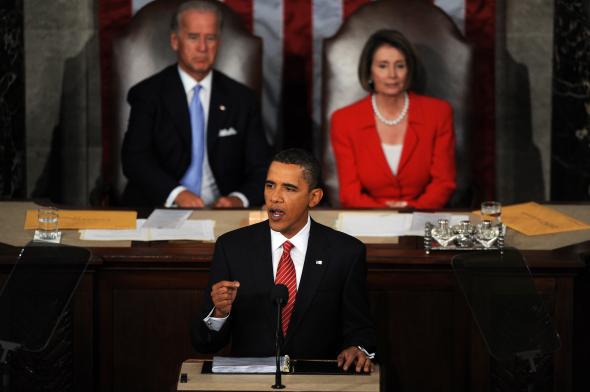The country is teetering on the brink of a government shutdown, driven by Republican demands for a one-year delay of the main portions of Obamacare. So a natural question to ask is: Why has the start of the main portions of Obamacare been delayed so much already? Delayed not in terms of blown deadlines—delayed by design. If the law passed in early 2010, why are we sitting here in September of 2013 looking forward to people signing up for insurance plans that won’t begin until January of next year?
The simple answer is: politics and the Democrats’ narrow thinking. The bill was to be phased in slowly because they wanted to hit some arbitrary budget targets. The country has been much worse off for the decision.
The original sin dates back to the speech Obama delivered to a joint session of Congress in September 2009. It’s best known as the speech Rep. Joe Wilson (R-S.C.) interrupted by shouting “You lie!” in the middle of the president’s reassurances that unauthorized immigrants to the U.S. wouldn’t receive health benefits. It also included these fateful words: “The plan I’m proposing will cost around $900 billion over 10 years—less than we have spent on the Iraq and Afghanistan wars, and less than the tax cuts for the wealthiest few Americans that Congress passed at the beginning of the previous administration.”
This was absolutely true, and the commitment to this number has been an absolute disaster.
The problem is that although Obama’s plan really did cost less than $900 billion over “the next 10 years,” it hit that number because for several of those 10 years, the plan would be barely in place. It’s not until next year that many more low-income Americans will become eligible for Medicaid coverage. It’s not until next year that many currently uninsured working-class Americans will be eligible for subsidized private health care plans. If you add up the costs of the first 10 years after those initiatives, it comes out to considerably more than $900 billion.
Conservative critics noted this at the time, and they had a fair point. The White House talking point on the overall cost of the program was misleading. But the more serious sin is that the program was substantively compromised to fit the terms of the talking point.
During his extended faux-filibuster on the Senate floor last week, Ted Cruz (R-Texas) read aloud the entire text of Dr. Seuss’ Green Eggs and Ham. It was an unintentionally appropriate choice of text. The Democrats’ entire bet on the Affordable Care Act is that, just like in the book, people will like the new law once they try it. Most Americans currently have health insurance, and the vast majority of us will see no immediate change. Many small businesses will get some added benefits, many currently uninsured people will get insurance, and everyone will have a small measure of additional security around the possibility of losing coverage in the future. I think the Democrats’ bet on this is correct. But the main reason Obama finds himself in the position of Sam-I-Am trying to assure people that they’ll love the green eggs and ham is that the law still hasn’t taken effect.
The desire to reduce the headline cost inside the 10-year scoring window isn’t the only source of delay—it was never going to be logistically possible to do immediate implementation—but it is an important one.
The administration has tried to get around this problem of delayed implementation by front-loading some goodies. Already many young people are enjoying expanded eligibility to stay on their parents’ insurance plan, and people with employer-provided coverage are gaining some additional regulatory benefits. Some folks even got a check from their insurer earlier this year—a rebate guaranteed by law to customers of insurance companies that don’t pay out enough of their revenue in actual medical benefits.
But in many ways, these first glimpses of Obamacare have had the opposite effect of what’s intended. The launch of the exchanges, the subsidies, and the Medicaid expansion is the heart of Obamacare. Rolling out other elements of the law as an early teaser mostly serves to separate them psychologically from the big launch of mainline Obamacare.
The delay and the obsession with the 10-year scoring window also made it impossible to use the bill as a vehicle for economic stimulus. It was substantively important for the country that the bill reduce the long-term budget deficit. But reducing the deficit within the 10-year scoring window was a pure question of talking points. Had Democrats been willing to put the talking points aside, they could have structured the law to start spending money faster—for example, by phasing the Medicaid expansion at least to start right in 2011—even while leaving the taxes on the same pace. That would have exposed Democrats to more charges of being big-spending, deficit-crazed Keynesians, but they faced those charges anyway. And had they pulled the trigger earlier, the economy would be in better shape today, and Republicans would be talking about taking away benefits that people are already enjoying.
Of course hindsight is 20/20. But there’s a lesson here for the future. Talking points and Congressional Budget Office scores matter much less than people inside the Washington bubble think. It’s naïve to think that good policy is always the best politics, but it’s a mistake to put tactics ahead of the basic merits of your ideas. There’s clever, and then there’s too clever by half. Delaying the rollout of a massive spending program to try to make it look a little less massive was dumb, and part of what’s happening today is that Democrats are paying the price for it.
Read more of Slate’s coverage of the government shutdown.
